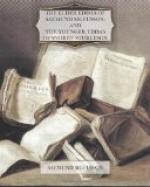HLODYN, the name of Frigga, as the symbol of the earth; protectress of the hearth—of the household. The Romans also worshipped a goddess of the earth and of fire under the common name of Fornax, dea fornacalis. Grimm mentions a stone found at Cleves with the remarkable inscription—DEAE HLUDANAE SACRVM C. TIBERIVS VERVS, and remarks that Hludana was neither a Roman nor a Celtic goddess, and could be no other than Hlodyn, which shows the identity of the German and Scandinavian Mythology.
HLOKK, or HLAUKK, to exalt, to clang, to cry like an eagle.
HNIKARR, or NIKARR, victor, a conqueror; to move, to agitate; to thrust forward, to take by violence; to repel, to impede. G. m. Nix, fern. Nixe, an aquatic genius. We may remark that the monks having transformed Odin into the devil, our designation of his Satanic Majesty, as Old Nick appears to be a mere corruption of these appellations of the Teutonic divinity.
HNOSSA, a ball of yarn, a clew of thread, a knot.
HODUR, prop. HODR. Grimm thinks that the original signification may have been war, combat.
HOFVARPNIR, a horse that plies well its hoofs, a good goer.
HRAESVELGUR, lit. Raw-swallower, i.e. swallowing raw flesh like an eagle.
HRAFNAGUD, the Ravens’ god; brafn; G. rabe; E. raven.
HRIMFAXI: brim, rime, or hoar frost; fax, a crest, a mane. The E. prop, name Fairfax, means fair-haired.
HRIMTHURSAR, the Rim or Frost Giants: thurs, a giant.
HRINGHORN, lit. a ringed or annulated horn.
HRIST, from v. hrista, to shake, to agitate.
HRYM, HRYMUR, prob. from brim, rime—hoar frost.
HUGI, and HUGINN, from hugr, spirit, breath, thought, mind, reason.
HVERGELMIR, the roaring cauldron; a spring of hot water.
HYRROKIN, lit. Smoky-fire; utter darkness, also smoke.
IDAVOLLR: vollr, a field, a place; to flow together; to ramble, to take a pleasant walk.
IDUNA, prop. IDUNN or ITHUNN. May mean one who loves either the confluence of waters, or to work, or to take a pleasant ramble.
JAFNHAR. The Equally High; lit. even so high.
JARNVIDR, Iron-wood.
JORD, JORTH, the earth.
JORMUNGANDR. Gandr sig. serpent, and more prop, wolf: jormun is a word of uncertain origin, but appears in all the anc. Teutonic lang. to have expressed the idea of great, maximus, universal. The reader will find much curious information on this subject in Grimm’s admirable work.
JOTUNHEIMR, lit. Giants’-home, the region of the Giants.
KERLAUG: ker, any kind of vessel, cup, bowl, &c; also used to denote the bed of a river.
KJALARR, prob. from v. kjala, to transport, to convey; a ship, a keel.
KVASIR. This word seems to be used in the sense of a drinking bout.




